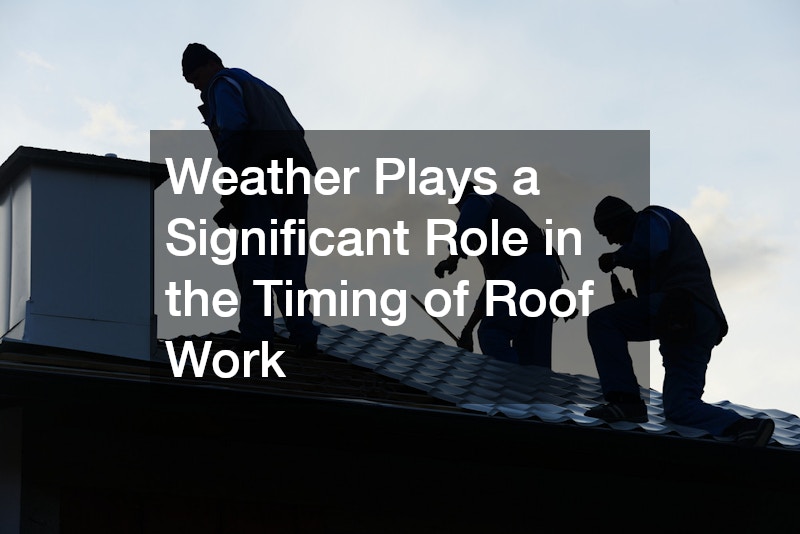The decision to hire a roofing contractor should be based on the condition of your roof, your skill level, and the potential consequences of delaying repairs. Understanding the warning signs and timing can save money, extend your roof’s lifespan, and protect your home. The following sections will help you recognize when professional intervention is the smartest choice.
Recognizing Signs of Roof Damage
It is important to know the early warning signs that your roof may be in trouble. Common indicators include missing or damaged shingles, sagging rooflines, interior water stains, or visible mold growth. These issues can occur gradually over time or suddenly after a storm, and they often signal that your roof’s protective barrier has been compromised. Catching these signs early can help prevent further deterioration and more expensive repairs later.
Homeowners should look for cracked shingles, curling edges, granule loss in gutters, and daylight peeking through the attic ceiling. A sudden spike in energy bills can also indicate that heat or cool air is escaping due to poor roof insulation or ventilation. When any of these issues are present, contacting a roofing contractor promptly can prevent minor problems from escalating into significant structural damage.
Understanding the Risks of Delaying Repairs
Postponing necessary roof repairs may seem like a way to save money in the short term, but it can lead to more significant issues that are far costlier to address. Leaks can spread quickly, causing rot in the wooden structure beneath the roof and compromising your home’s overall integrity. Mold growth from prolonged moisture exposure can also create serious health hazards for home residents.
For example, a small leak that’s ignored during the rainy season can quickly become extensive water damage, requiring roof repairs and ceiling and wall restoration. Additionally, structural damage from prolonged neglect can weaken your home’s framework, resulting in safety concerns and even a total roof replacement rather than a simple patch job. Professional intervention at the first sign of trouble is the best way to avoid these compounding risks.
Evaluating the Benefits of Professional Expertise
Professional roofing contractors bring skills, training, and efficiency levels that most homeowners cannot match. They’ve the knowledge to diagnose problems accurately and the equipment to complete repairs or installations safely. Beyond their technical expertise, they are familiar with local building codes and can ensure that your roof meets all necessary regulations.
For instance, a trained roofing professional can identify hidden issues such as improper flashing, inadequate ventilation, or underlying rot that might not be visible to an untrained eye. They also have access to high-quality, more durable materials than those found in most retail stores. Hiring a contractor not only improves the quality of the repair but also typically comes with a warranty, giving homeowners added peace of mind.
Considering Seasonal and Weather Factors
Weather plays a significant role in the timing of roof work. Certain seasons are better suited for specific types of repairs or installations, and ignoring these seasonal advantages can lead to delays or subpar results. Roofing in extreme heat or cold can affect material performance and worker safety, while heavy rainfall can complicate installation and increase the risk of leaks.
For example, many contractors recommend scheduling major roof projects in the spring or fall, when temperatures are moderate and weather patterns are more predictable. If a severe storm is forecasted, it’s wise to inspect your roof beforehand to address any vulnerabilities. Seasonal awareness ensures that your repairs are completed efficiently and effectively, reducing the chances of weather-related complications.
Planning for Long-Term Roof Maintenance
Regular roof maintenance is essential for extending its lifespan and avoiding costly repairs. This includes periodic inspections, cleaning gutters, removing debris, and addressing minor issues before they become significant problems. Proactive maintenance not only protects the structure of your home but also preserves its appearance and resale value.
This might mean scheduling a professional inspection once or twice a year, especially after severe weather events. A contractor can identify and fix minor issues—such as loose shingles or blocked ventilation—before they cause larger problems. Long-term maintenance planning helps ensure that your roof remains strong, functional, and aesthetically pleasing for years.
Your roof is a vital investment protecting your home, belongings, and family. Knowing when to hire a roofing contractor can prevent minor damage from becoming major structural concerns. By recognizing the signs of roof damage, understanding the risks of delay, valuing professional expertise, considering seasonal timing, and committing to ongoing maintenance, you can keep your roof in optimal condition for decades.
Taking prompt action and trusting skilled professionals ensures your home remains safe, secure, and ready to withstand whatever nature throws. A well-maintained roof isn’t just a functional necessity—it’s a critical element of your home’s overall strength and value.





